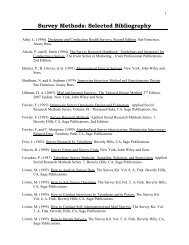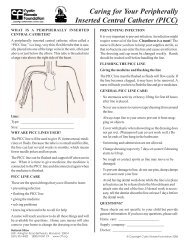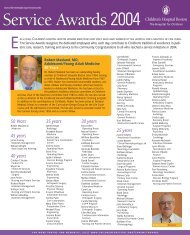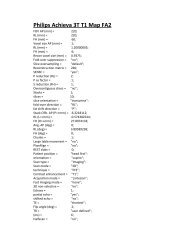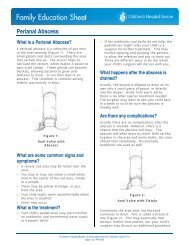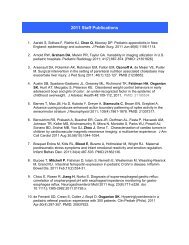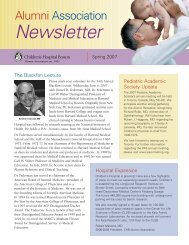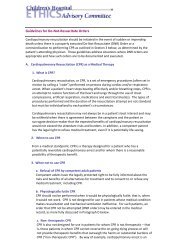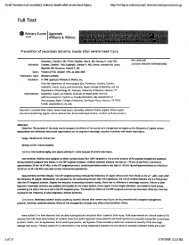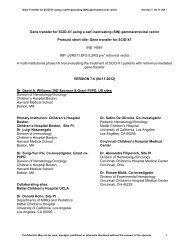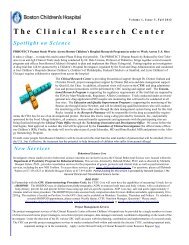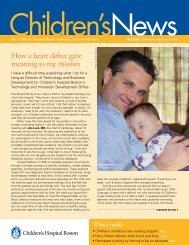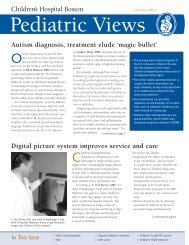Mentoring - Children's Hospital Boston
Mentoring - Children's Hospital Boston
Mentoring - Children's Hospital Boston
You also want an ePaper? Increase the reach of your titles
YUMPU automatically turns print PDFs into web optimized ePapers that Google loves.
<strong>Mentoring</strong><br />
Seven Roles and Some Specifics<br />
Martin J. Tobin<br />
Division of Pulmonary and Critical Care Medicine, Loyola University of Chicago Stritch School of Medicine and Hines Veterans Affairs <strong>Hospital</strong>,<br />
Hines, Illinois<br />
In Homer’s legend, when Ulysses, the king of Ithaca, went away<br />
to make war on the Trojans, he left his infant son, Telemachus,<br />
in the hands of Mentor (1). Ulysses was gone for twenty years,<br />
and Mentor guided Telemachus in practical skills, such as archery<br />
and wrestling, and also provided advice on moral matters. Giving<br />
advice, however, is naive and presumptuous (2). Naive, because<br />
experience cannot be transmitted; instead, each generation has<br />
to acquire it for itself. Presumptuous, because no one has a<br />
monopoly on wisdom; and those imagining themselves well endowed<br />
are the least wise (3).<br />
Books containing advice for young professionals come in two<br />
forms: compendia of tedious pieties, and amoral manuals of<br />
dodges and shady practices for getting on in the world (4). An<br />
attempt to provide a noncynical description of the good mentor<br />
inevitably falls into the former category and exposes an author<br />
to accusations of moralizing oversimplification. Yet fear of being<br />
labeled a self-righteous moralizer is insufficient defense for shying<br />
away from the challenge.<br />
A mentor can be defined as an older academician who takes<br />
a special interest in a younger person—a fellow or a junior<br />
member of faculty (1). The older person is called the mentor,<br />
but there is no good term for the younger person (5). The lack<br />
of a self-evident term to describe the object of the mentor’s<br />
interest bespeaks of much confusion on the subject. I focus solely<br />
on the mentoring of a fellow who wants to become a physicianresearcher.<br />
I make liberal use of quotations, not simply for calling<br />
on authority to buttress my case but for the illumination they<br />
provide.<br />
SEVEN ROLES<br />
The physician-researcher as mentor has at least seven roles to<br />
fill: teacher, sponsor, advisor, agent, role model, coach, and confidante<br />
(1, 6, 7). The mentor needs to customize each role to<br />
match the characteristics of the fellow. The following description<br />
is an ideal after which mentors strive. It is also an ideal that<br />
perhaps no mentor can fully attain.<br />
Teacher<br />
The mentor and laboratory assistants teach the fellow the technical<br />
skills unique to their field of research. The mentor guides<br />
the fellow in how to read in an efficient manner and how to<br />
reason from first principles. The fellow learns to write scientific<br />
manuscripts by getting back drafts covered in red ink. The men-<br />
Supported by a Merit Review grant from the Veterans Affairs Research Service<br />
Correspondence and requests for reprints should be addressed to Martin J. Tobin,<br />
M.D., Division of Pulmonary and Critical Care Medicine, Hines Veterans Affairs<br />
<strong>Hospital</strong>, Route 111N Hines, IL 60141. E-mail: mtobin2@lumc.edu<br />
This article has an online supplement, which is accessible from this issue’s table<br />
of contents online at www.atsjournals.org.<br />
Am J Respir Crit Care Med Vol 170. pp 114–117, 2004<br />
DOI: 10.1164/rccm.2405004<br />
Internet address: www.atsjournals.org<br />
tor teaches the fellow how to apply for grants, and how to review<br />
manuscripts (8). The mentor knows that education is not just<br />
the imparting of facts—after all, these can be obtained in a book<br />
(9). Instead, the ultimate goal of education is the formation of<br />
character (the aggregate of qualities that constitute the moral<br />
backbone of an individual) (10, 11). Henry Adams encapsulated<br />
the legacy of teaching: “A teacher affects eternity; he can never<br />
tell where his influence stops.”<br />
Sponsor<br />
As sponsor, the mentor introduces the fellow to a new social<br />
world (6). Up to now, the fellow’s world has been parochial. To<br />
succeed in research, the fellow needs to learn who’s who among<br />
the cast of characters in a subdiscipline. When the fellow first<br />
presents a research poster, the mentor lists researchers who have<br />
a reputation for helping young people. When these individuals<br />
come by the poster, the mentor tells the fellow to be very open<br />
in discussing limitations of the study because they will help fix<br />
them. The mentor also names another set of individuals who<br />
get pleasure out of belittling a fellow, warning the fellow to be<br />
on guard when interacting with them. Over time, the mentor<br />
instills in the fellow the values and customs that make up the<br />
norms of science.<br />
Advisor<br />
The mentor serves as advisor and counselor (1, 7). The fellow<br />
needs a sounding board and reality check to help refine ideas<br />
and gain clarity of thought. Being older, the mentor supplies the<br />
missing experience—been there, done that. The fellow doesn’t<br />
need someone to pave the road, but needs help in becoming a<br />
better navigator. The mentor doesn’t try to personally solve the<br />
fellow’s problems, but helps the fellow craft his or her own<br />
solution—to become self-reliant. The mentor is not a nursemaid<br />
or escort, but a catalyst for growth (5). A good mentor is an<br />
amateur psychoanalyst, understanding what makes people tick.<br />
The mentor’s greatest contribution may be in listening, saying<br />
little. As Rousseau told us, people who know a lot tend to say<br />
very little, whereas people who know little speak a lot. A good<br />
mentor understands that it is best to give advice only when it is<br />
requested (12).<br />
<strong>Mentoring</strong> should not be confused with being a faculty advisor<br />
(7, 13). With the latter, the exchange is relatively formal, largely<br />
unidirectional, with little if any personal bonding. The exchange<br />
may occur only once, whereas mentoring involves years of repeated<br />
back and forth, eyeball to eyeball. A student may not<br />
view the faculty advisor as a role model, whereas a mentor is<br />
always seen as a role model.<br />
Agent<br />
The mentor acts as an agent (7). The fellow knows the mentor<br />
will go to bat for him or her. The mentor removes obstacles,<br />
but only after the fellow has made a convincing attempt. And<br />
the mentor is careful to avoid spoonfeeeding, which stunts the<br />
development of independence.
Occasional Essays 115<br />
Role Model<br />
The fellow views the mentor as a role model and wants to<br />
emulate his or her approach to academic life (14). Young people<br />
do not assimilate values by listing attributes they wish to develop<br />
(truth, caring, judgment) and looking up their definitions (15).<br />
Instead, they identify with people who appear to have these<br />
attributes, and emulate their behavior. Fellows do not learn<br />
values from having them preached at them, but from seeing<br />
values enacted in the routine of daily life. Values are best transmitted<br />
through deeds, not words—a how, not a what. And that<br />
is why role models are so important in medicine.<br />
The fellow observes the mentor’s professional priorities. The<br />
time devoted to helping colleagues, such as volunteer work in<br />
reviewing manuscripts that goes uncredited by promotion committees<br />
(16). The mentor’s intellectual and scholarship style: it<br />
must be unmistakable that he or she enjoys learning. The approach<br />
to thoroughness and truth telling. The mentor’s ability<br />
to make work appear more fun than fun, and make drudgery<br />
appear worthwhile. Success in research can lead to arrogance,<br />
although Claude Bernard believed true scientific prowess leads<br />
to a proportional decrease in pride (17). The fellow sees how<br />
the mentor interacts with peers: the exercise of restraint, and<br />
the instinct for maneuvering between behavior that might be<br />
uncomfortably allowed and behavior that is impermissible. The<br />
fellow sees the moral element in the mentor’s identity: how<br />
the mentor defines what lines will not be crossed, and why (18).<br />
The bulk of the fellow-mentor interaction is in the research<br />
setting, but the mentor’s behavior as a clinician—irrespective of<br />
whether his or her research is basic or patient oriented—will<br />
determine how well the mentor transmits the values of academic<br />
medicine. It must be crystal clear that the patient is always first<br />
priority. The core values articulated by the mentor must be<br />
evident in actions: he or she must walk the talk. When a mentor<br />
fails to practice what is being preached, the hypocrisy mutes the<br />
effectiveness of the advice (19).<br />
Role models and mentors are often confused (5). Most people<br />
who serve as role models do not act as mentors. Michael Jordan<br />
is a role model for thousands. If he is to become a mentor, it<br />
will only be for a handful of people. Likewise, William Osler<br />
was a role model for thousands of physicians, but mentored only<br />
a few. Many role models are like bright shining stars: as you get<br />
closer, they seem too hot to touch (5). Most physician trainees<br />
never have a true mentor—there are not enough to go around<br />
(5, 6, 13). They have role models and faculty advisors. Having<br />
a real mentor will always be a privilege of only a few.<br />
Coach<br />
A good coach motivates the players to win. Knowing when to<br />
offer encouragement. When to push. And when to pause and<br />
take a break. A mentor has to push for action while tolerating<br />
inaction—a cause of considerable tension in the mentor (12). A<br />
basketball coach is judged by the success of the players, not by<br />
his or her own skill at shooting baskets. Likewise, a mentor<br />
recognizes that it is far easier to give a lecture than to guide a<br />
fellow in how to do it.<br />
Motivating is the fulcrum around which coaching revolves.<br />
The mentor conveys the sense of awe about the workings of the<br />
body: the excitement in helping to unravel its complexity. He<br />
or she imbues the fellow with the power of science, the best<br />
hope for achieving progress (20). Science doesn’t prevent any of<br />
us from making mistakes. But through the criticism of colleagues,<br />
errors are gradually corrected and we approach truth. The mentor<br />
communicates the thrill of discovery—no drug is more addictive<br />
(21). The mentor relates to the fellow the comfort derived<br />
from knowing that the research of today is connected to a much<br />
greater process: contributing to the increase in scientific knowledge<br />
and improved care of patients—work of everlasting value.<br />
This thought helps one realize how trivial are the slings and<br />
arrows of everyday life. But comfort of mind must not spill<br />
over into complacency. Jacques Monod, one of the founders<br />
of molecular biology, warned, “Personal self-satisfaction is the<br />
death of the scientist. Collective self-satisfaction is the death of<br />
research. It is restlessness, anxiety, dissatisfaction, agony of mind<br />
that nourish science” (22). Proper balancing of anxiety and comfort<br />
of mind achieves equanimity.<br />
The most creative individuals are driven by curiosity, getting<br />
their reward directly from their work (causing colleagues to<br />
think them odd) (18). The best people in an organization want<br />
to work for reasons beyond salary or title, as if volunteers (23).<br />
The mentor relates the sense of fulfillment from working in<br />
public service (adding that thanks is rarely vocalized, and is<br />
communicated least when the responsibility is greatest). Addressing<br />
young people, Albert Schweitzer said, “I don’t know<br />
what your destiny will be, but one thing I know: the only ones<br />
among you who will be really happy are those who will have<br />
sought and found how to serve.” There is no smaller package<br />
than an individual wrapped up in him or herself.<br />
The mentor raises the bar and sets high standards. The fellow<br />
is encouraged to achieve full potential: to reach for, and achieve,<br />
more than he or she thought possible (24). People are not motivated<br />
by small challenges. “Make no little plans. They have no<br />
magic to stir men’s blood,” mused Daniel Burnham, the Chicago<br />
architect. The mentor helps the fellow to take risks, to move<br />
outside a zone of comfort. Expectations are lofty, yet realistic<br />
(7). The idea is to distend, but not perforate.<br />
Confidante<br />
The mentor serves as a confidante: someone the fellow can<br />
talk to, knowing the discussions are kept in strict confidence.<br />
<strong>Mentoring</strong> is more an affair of the heart than of the head (7, 25).<br />
It is a two-way relationship based on trust—the glue that prevents<br />
the units of daily living from falling asunder. The mentor wins<br />
and sustains the fellow’s trust through constancy (staying the<br />
course), reliability (being there when it counts), integrity (honoring<br />
commitments and promises), and congruity (walking the<br />
talk) (26).<br />
For the fellow’s development, the mentor’s most critical function<br />
is to help the fellow live out a dream (1, 6). A young person’s<br />
dream is a personal myth, an imagined drama in which he or<br />
she is the central character—a role widely portrayed in literature.<br />
The mentor helps the fellow realize this dream through affirmation<br />
and by helping the fellow emerge in a new world. <strong>Mentoring</strong><br />
involves an elemental form of the parental impulse, yet is quite<br />
different (6). Unlike a parent, the mentor must also be part peer.<br />
Excessive paternalism in a mentor will interfere with the primary<br />
function as a transitional figure. The mentor’s task is to liberate<br />
the fellow, and not be overly protective. An actual parent can<br />
provide some of the functions of a mentor. But he or she cannot<br />
be the primary mentor figure because a parent is too closely<br />
connected to the offspring’s pre-adult development (in both their<br />
minds) (6).<br />
Objectivity must be maintained: the relationship must not be<br />
seen as favoritism. The mentor not only conveys compliments,<br />
but also points out weaknesses (6, 7). When criticizing, the mentor<br />
focuses on behavior, not the person. Specificity is especially<br />
important: not much can be learned from vague criticism (or<br />
vague praise) (25). A hundred-year-old letter from William<br />
Osler, mentor to Harvey Cushing, can be seen in the online<br />
supplement (1). Osler points out that specific aspects of Cush-
116 AMERICAN JOURNAL OF RESPIRATORY AND CRITICAL CARE MEDICINE VOL 170 2004<br />
ing’s behavior will be fatal to his success. Osler specifies why<br />
this behavior is a problem, and ends by saying he knows that<br />
Cushing will not mind the criticism because he understands that<br />
Osler has his interest at heart. There is no fellow that does not<br />
need to have aspects of behavior criticized. But the task requires<br />
considerable tact: inept criticism surpasses mistrust, personality<br />
struggles, pay disputes, and power struggles as a source of conflict<br />
on the job (25). By holding up a mirror, the mentor enables the<br />
fellow to see how his or her character is developing (5).<br />
The fellow has feelings of respect, admiration, and appreciation<br />
for the mentor, but also feelings of inferiority, intimidation,<br />
envy, and resentment (6). The fellow oscillates between beliefs<br />
of being an inept novice, fraudulent imposter, and a rising star<br />
that will outshine the mentor. Starting out in a subservient position,<br />
the fellow matures to become an equal over time and<br />
the relationship evolves into a meaningful friendship. But the<br />
relationship can also dissolve into bitterness (6). This may occur<br />
because the mentor is bad. Or because of arrogant ingratitude<br />
on the part of the fellow. Tacitus grumbled that man is more<br />
willing to repay an injury than repay a benefit, because gratitude<br />
is a burden whereas revenge is a pleasure.<br />
AND SOME SPECIFICS<br />
Handling Failure<br />
Because it is disheartening, we think of failure as all negative.<br />
But it’s not (15, 27). Failure tells the size of the challenge taken<br />
on. A research project that appears a totally safe investment has<br />
a much smaller chance of making a substantial advance than a<br />
project carrying a distinct chance of failure. Fear of failure is<br />
the death of progress. A fellow can learn more from failure than<br />
from success, because one has to ask oneself why one failed.<br />
With success, a fellow may get rewarded for the wrong reasons,<br />
which encourages bad habits. Major achievers are rarely satisfied<br />
by success, and are instead spurred on—rather than deterred—by<br />
setbacks (11). “I regard every defeat as an opportunity,”<br />
affirmed Jean Monnet, founding father of the European<br />
Community (19). But failure is bruising, and the fellow has to<br />
learn not to show it. When the fellow encounters failure, the<br />
mentor is there to provide reassurance and to caution that dwelling<br />
too much on the past can rob one of the future.<br />
Steps to Success<br />
Along the way, the mentor shows the fellow what is needed for<br />
success. Success is not achieved by short cuts and gimmickry,<br />
but by hard work and persistence (5). “Nothing in the world<br />
can take the place of persistence. Talent will not; nothing is<br />
more common than unsuccessful men with talent. Genius will<br />
not; unrewarded genius is almost a proverb. Education will not;<br />
the world is full of educated derelicts. Persistence, determination<br />
alone are omnipotent,” counseled Calvin Coolidge (28). Persistence<br />
is the hard work you do after you get tired of doing the<br />
hard work you have already done (14). The fellow needs to<br />
think of a task as beyond the whole. When running a 100-yard<br />
dash, serious runners aim for 110 yards, so no one will beat them<br />
in the last few yards. If they run fast for only 95 yards, the lack<br />
of those final 5 yards makes the first 95 pointless (23).<br />
The second requirement is focus, the principle most often<br />
violated. Focus needs mental discipline, which is unpopular.<br />
Without focus, the fellow ends up with numerous unfinished<br />
projects.<br />
Time management is third. Time is the most scarce resource<br />
in academic life. Yet it’s treated as having no value. Time is<br />
inelastic. “Work expands so as to fill the time available for<br />
its completion,” says Parkinson’s Law (17). Academicians who<br />
complain the most about being extremely busy are often the<br />
lowest achievers. The mentor teaches the fellow to document<br />
for him or herself where the time goes, to spot time wasters<br />
and be ruthless in eliminating them. And the fellow learns that<br />
wasting time that leads to innovation is good, and dumping bad<br />
work is efficient.<br />
The fourth requirement for success is learning how to handle<br />
the natural desire for credit (29). Originality, and its corollary<br />
priority, are major driving forces in science—aggravated by the<br />
tendency for discoveries to be made simultaneously in more<br />
than one laboratory. Attaining priority requires ambition, a word<br />
with many meanings and wide variation in moral implications<br />
(30). Ambition is healthy when it connotes persistence, resolution,<br />
and discipline. But vaulting ambition that includes corner<br />
cutting and self-promotion is a disfigurement. The best way to<br />
get research done, and succeed in academia, is not to mind who<br />
gets credit for it (29). Lots of praise early in a career—even when<br />
deserved—can make it more difficult to cope with subsequent<br />
setbacks (29). This thought is communicated in the saying, “I<br />
have been told of so many coming men. But where do they all<br />
go”? And in, “Whom the gods wish to destroy they first call<br />
promising.”<br />
Picking a Mentor<br />
When scouting for a mentor, what should the fellow look for?<br />
Fellows in their late twenties should seek mentors in their late<br />
thirties or forties—a half-generation older (6). Forty-year-old<br />
faculty members have usually shed some of their earlier envies,<br />
animosities, and petty vanities, enabling them to be more understanding<br />
mentors. Enthusiasm is the most important quality: the<br />
mentor believes his or her research area is the most exciting in<br />
the world. Time: the good mentor makes time to see the fellow,<br />
even though he or she may be the busiest person on campus.<br />
Leadership always comes down to a question of character: an<br />
inner set of values directing a person to what is virtuous or right<br />
(18, 31). The world loves talent but pays off on character (27).<br />
Next come commitment, common sense, competence, responsibility,<br />
and conscience (the inner voice that says somebody may<br />
be looking). Because the fellow will need advice about future<br />
career, he or she needs a mentor who has good judgment. The<br />
good and bad are never neatly separated and most of life is<br />
spent making discriminate judgments at the margins (30). In<br />
truth, the challenge is more complicated: the choice is rarely<br />
between straight bad and good, but in picking the best tradeoff<br />
among several good options (32). Judgment is the ability to<br />
combine hard data, questionable data, and intuitive guesses to<br />
arrive at a conclusion that events prove to be correct (33). And<br />
lastly the fellow looks for maturity, self-confidence, vision, and<br />
a mentor with awareness of what’s happening in the academic<br />
world outside his or her own institution.<br />
A bad mentor sounds like a contradiction in terms, but some<br />
fellows get stuck with a faculty supervisor who lacks mentoring<br />
skills (6). The bad mentor is selfish with time. (Time given by<br />
a good mentor is immeasurable—and the part least recognized<br />
by people who are not mentors.) A bad mentor wants all the<br />
glory—it’s not enough to see the fellow shine—and may even<br />
envy the attention the fellow attracts. Instead of nurturing academic<br />
development, the mentor exploits the fellow as a technician.<br />
A mentor may also act like Professor Higgins in My Fair<br />
Lady and try to make the fellow into an image of his or her<br />
own choosing, rather than fostering individuality and independence.<br />
An overprotective mentor, though meaning well, is also<br />
bad for the fellow’s development.<br />
<strong>Mentoring</strong> at a Distance<br />
When fellows find no faculty member to serve as a mentor, they<br />
must take responsibility for aspects of their own education. Some
Occasional Essays 117<br />
giants in history—Shakespeare and Beethoven—had no personal<br />
mentors (34). Einstein received his mentoring at a distance<br />
through reading Mach, Poincairé, and Maxwell (34). Churchill<br />
never attended university, and educated himself by studying the<br />
works of Gibbon, Macaulay, and others (35); the permanent<br />
effect of the former two is evident in Churchill’s oratory and<br />
writing. The total aggregate of Lincoln’s schooling amounted to<br />
less than a year (30). But he was a bookworm, and over time<br />
Lincoln’s intellectual self-confidence surpassed that of graduates<br />
of the best universities. Books enable a person in isolated circumstances<br />
to communicate across years and oceans with the greatest<br />
of minds (30). Many leaders have found their principal mentors<br />
and models entirely in books (26). For example, Nelson Mandela<br />
was hugely inspired by General Kutuzov in Tolstoy’s War and<br />
Peace (36). Researchers of any age can benefit from the insights<br />
and maxims contained in the books of Peter Medawar, Michael<br />
Polanyi, Richard Feynman, and John Ziman.<br />
Not Pure Altruism<br />
<strong>Mentoring</strong> is a two-way street, with mentors needing fellows as<br />
much as the latter need a mentor (6). As with all teaching, mentors<br />
learn more from pupils than they teach them. A researcher gets<br />
more done by involving bright young people on projects than<br />
working as a lone wolf. The mentor benefits from the reflected<br />
glory of the fellow who does well. But the major benefit is the<br />
fun of interacting with young people. The interchange liberates<br />
forces of youthful energy within the mentor, and he or she gets<br />
rejuvenated (6). Osler warned that the physician “who wraps<br />
himself in the cloak of his researches, and lives apart from the<br />
bright spirits of the coming generation, is very apt to find his<br />
garment the shirt of Nessus”—and he will also miss out on “the<br />
greatest zest in life” (37). By communicating the most important<br />
values of medicine, the mentor satisfies the Hippocratic obligation<br />
of passing knowledge to the next generation and at the<br />
same time satisfying the desire to pay back (1). “I hold every<br />
man a debtor to his profession,” intoned Francis Bacon.<br />
CONCLUSION<br />
In guiding Telemachus, Mentor was assisted by Athena, the<br />
Greek goddess who embodied good counsel, prudent restraint,<br />
and practical insight (1). Mentors in academic medicine are mere<br />
mortals, and do not get help from Greek goddesses. The virtues<br />
I list for the ideal mentor are intimidating. A wise reader may<br />
wonder whether through writing this essay, I am succumbing to<br />
the counsel of my fellow Irishman, Oscar Wilde: “I always pass<br />
on good advice. It is the only thing to do with it. It is never of<br />
any use to oneself.”<br />
Conflict of Interest Statement : M.J.T. is editor of AJRCCM. He receives a fixed<br />
stipend from the American Thoracic Society. He does not receive financial support<br />
for research from pharmaceutical, biotechnology, or medical device companies.<br />
He does not serve as a consultant to or on the advisory board of any company.<br />
He receives royalties for two books on critical care published by McGraw Hill, Inc.<br />
References<br />
1. Barondess JA. A brief history of mentoring. Trans Am Clin Climatol<br />
Assoc 1994;106:1–24.<br />
2. Comte-Sponville A. A short treatise on the great virtues: the uses of<br />
philosophy in everyday life. London: Vintage; 2003, p. 5.<br />
3. Mortimer J. Where there’s a will. London: Viking; 2003, p. 5.<br />
4. Starr P. The social transformation of American medicine. New York:<br />
Basic Books; 1982, p. 86.<br />
5. Harris ED Jr. ARA presidential address. Wanted: catalysts for growth.<br />
American Rheumatism Association. Arthritis Rheum 1986;29:1297–<br />
1300.<br />
6. Levinson DJ. The seasons of a man’s life. New York: Ballantine Books;<br />
1978, p. 97–101, 245–254, 333–334.<br />
7. Souba WW. <strong>Mentoring</strong> young academic surgeons, our most precious<br />
asset. J Surg Res 1999;82:113–120.<br />
8. Hoppin FG Jr. How I review an original scientific article. Am J Respir<br />
Crit Care Med 2002;166:1019–1023.<br />
9. Tosteson DC. Learning in medicine. NEnglJMed1979;301:690–694.<br />
10. Warnock M. An intelligent person’s guide to ethics. London: Gerald<br />
Duckworth & Co. Ltd.; 1998, p. 32, 155.<br />
11. Gardner H. Extraordinary minds. New York: Basic Books; 1997, p. 122,<br />
133.<br />
12. De Pree M. Leadership jazz. New York: Bantam Doubleday Dell Publishing<br />
Group; 1992, p. 144, 176.<br />
13. Anderson PC. <strong>Mentoring</strong>. Acad Med 1999;74:4–5.<br />
14. Loop FD. <strong>Mentoring</strong>. J Thorac Cardiovasc Surg 2000;119:S45–S48.<br />
15. Gardner JW. Self-renewal: the individual and the innovative society.<br />
New York: W.W. Norton & Company; 1995, p. 14, 124.<br />
16. Tobin MJ. Rigor of peer review and the standing of a journal. Am J<br />
Respir Crit Care Med 2002;166:1013–1014.<br />
17. Mackay AL. A dictionary of scientific quotations. Bristol: Institute of<br />
Physics Publishing; 1994, p. 29, 190.<br />
18. Gardner H, Csikszenthmihalyi M, Damon W. Good work: when excellence<br />
and ethics meet. New York: Basic Books; 2001, p. 11, 20, 243.<br />
19. Gardner H. Leading minds: an anatomy of leadership. New York: Basic<br />
Books; 1995, p. pxii, 10.<br />
20. Bronowski J. The origins of knowledge and imagination. New Haven:<br />
Yale University Press; 1978, p. 85.<br />
21. Wilson EO. Consilience: the unity of knowledge. New York: Vintage;<br />
1999, p. 61.<br />
22. Monod J. Ariadne. New Sci 1976;70:680.<br />
23. De Pree M. Leadership is an art. New York: Dell Publishing Company;<br />
1989, p. 28, 143.<br />
24. Gardner JW. Excellence: can we be equal and excellent too? New York:<br />
W.W. Norton & Company; 1984, p. 149.<br />
25. Goleman D. Emotional intelligence: why it can matter more than IQ.<br />
London: Bloomsbury; 1995, p. 34, 152, 154.<br />
26. Bennis W. On becoming a leader. Reading, MA: Addison-Wesley Publishing<br />
Company; 1994, p. 93, 160.<br />
27. Gardner JW. Living, leading, and the American dream. San Francisco:<br />
Jossey-Bass; 2003, p. 44–45.<br />
28. Bennis W, Nanus B. Leaders. New York: Harper Business; 1985, p. 43.<br />
29. Medawar PB. Advice to a young scientist. New York: Basic Books; 1979,<br />
p. 34, 41, 51, 52.<br />
30. Miller WL. Lincoln’s virtues: an ethical biography. New York: Vintage;<br />
2003, p. 45, 47, 64, 65, 199.<br />
31. Bennis W, Biederman PW. Organizing genius: the secrets of creative<br />
collaboration. Reading, MA: Addison-Wesley; 1997, p. 158.<br />
32. Holloway R. Godless morality: keeping religion out of ethics. Edinburgh:<br />
Canongate Books; 1999, p. 16.<br />
33. Gardner JW. On leadership. New York: The Free Press; 1993, p. 49.<br />
34. Gardner H. Creating minds. New York: Basic Books; 1993, p. 377.<br />
35. Jenkins R. Churchill: a biography. New York: Plume; 2002, p. 24–25.<br />
36. Mandela N. Long walk to freedom. <strong>Boston</strong>: Back Bay Books; 1994, p. 492.<br />
37. Bliss M. William Osler: a life in medicine. New York: Oxford University<br />
Press; 1999, p. 391.




